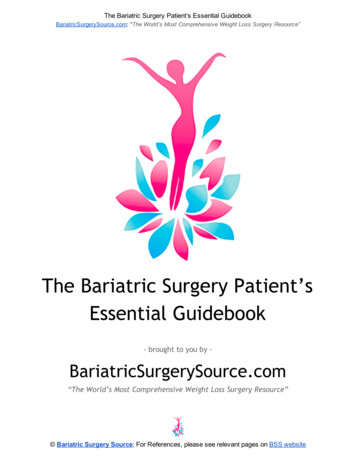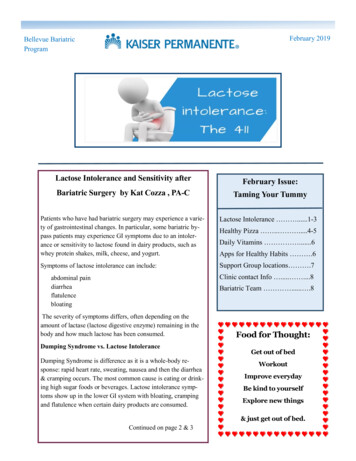
Transcription
North Carolina SurgeryGuide to SurgicalWeight Loss
Table of ContentsGetting Started7Financial & Insurance Info21Weight Loss Procedures25Gastric BypassVertical Sleeve GastrectomyDuodenal SwitchSIPS (Stomach Intestine Pylorus Sparing)What to Expect Before Surgery33What to Expect After Surgery37Discharge InstructionsPost-operative VisitsPost-operative CareUnderstanding body changesWhat to Report to the Doctors OfficeBowel HabitsAnemiaTransient Hair Loss/Skin ChangesPregnancy/SexualityEmotional Considerations49Exercise55Workout Tips, Choosing a Personal Trainer, Water Fitness, Chair Exercise, Resistance BandExercise, Exercise Goals You Can KeepLong Term Success65Nutrition73Section 1: Overview of Bariatric Surgery and Changes to Start Making NowSection 2: Menu Pattern and Exchange ListSection 3: Post Bariatric Surgery: How Does This All Work?Section 4: Pre-operative PlanningSection 5: Pre-operative Goals ChecklistSection 6: Shopping and ment guides are available for a fee
Getting Started
Getting StartedWelcome!Obesity presents many challenges to our patients,compromising both health and quality of life. AtNorth Carolina Surgery, our medical experts lookforward to helping you overcome this complexdisease through an integrated approach thatincludes lifestyle education, nutritional and psychological counseling, exercise training, and themost advanced and tested weight loss surgeryavailable. Most importantly, we offer committedand life-long support to guide you through thisremarkable journey.Our PhilosophyWe believe in creating an environment that encourages you to adopt and maintain a healthy lifestyle with regular exercise, constructive psychological training, and good nutrition. Combined with our commitment to evidence based and leading edge surgery, integrated specialty care, and lifelong support and surveillance, we believe in and expect success for each of our patients.The North Carolina Surgery Bariatric Surgery TeamOur approach to weight loss integrates several specialties for the treatment of obesity, including medical, psychological, andsurgical disciplines. Our dedicated surgeons, nurses, dietitians, psychologists, and exercise trainers work together to create anindividualized weight loss plan for you.Your health care team includes:Peter C. Ng, M.D., SurgeonLindsey S. Sharp, M.D., SurgeonDustin M. Bermudez, M.D., SurgeonErica McKearney, PA-CJillian Vari, PA-CKrista Herrell, R.N., B.S.N., Bariatric CoordinatorHannah Garehan, M.S., R.D., L.D.N.Mary Gray Hutchison, M.P.H., R.D., L.D.N.Caroline Pope, M.S., R.D., L.D.N.Margaret Roberts, M.S., R.D., L.D.N.(919) 784-4160 Direct Scheduling(919) 784-7874 T(919) 784-2801 Frexbariatrics.com7
Weight Loss Surgery Check ListUse this check list to make sure youhave everything in order for surgery.Insuranceq Call your insurance companyq Verify bariatric surgery coverage (see Financial & Insurance Information)Education Classq Attend at least two education class meetingsDateDate Appointmentsq DieticianThree group classes before surgery approvalDateDateDateq Bariatric Counseling (Psychology)NamePhoneDateq Lab WorkDateq GastroenterologistConsultation DateProcedure Dateq Smoking Cessation (If Applicable)Dateq Medical Clearance FormDateq 5-year Weight History FormDateq Sleep Study (may need a second study if positivefor sleep apnea)LocationPhoneDateq Gallbladder UltrasoundDateq Other ReferralsNameDateNameDate
Pre-op ChecklistThis checklist will need to be completed before we can send anything to the insurance for approval. Thisalso applies to self-pay patients. The checklist will need to be completed before scheduling surgery.Step 1: Please call your insurance company and confirm what your benefits are for bariatric surgery. The insurance mayask for a procedure code. The following are the codes we use for bariatric surgery and nutrition services.43774 - Removal of lap band43775 - Laparoscopic Vertical Sleeve Gastrectomy with EGD43644 - Laparoscopic Roux-En-Y Gastric Bypass with EGD43659 - Laparoscopic Duodenal Switch with EGD. This is an unlisted code because there is not a code for alaparoscopic duodenal switch.96101 and 90791 - Mental Health Coverage97804 - Group Nutrition class97803 - One on One NutritionStep 2:Monthly/Visit Template. Everyone’s template will vary depending on your insurance. Please follow the template toassure that you are meeting all requirements from your insurance company.Step 3:You will have three nutrition classes before we get authorization for surgery. There will be a fourth nutrition class thatwill be scheduled once you have a date for your surgery. There is a 50.00 no show fee for nutrition appointments.1. First class (Getting Started) Date . Please read your notebook that youwill receive at this first class.2. Second Class (Protein supplements) Date .READ and BRING YOUR NOTEBOOK3. Third Class (Vitamins/Minerals) Date . Please try the samples that are given toyou and mark which ones that you like on the order form. Read and BRING YOUR NOTEBOOK.4. Fourth Nutrition Class (Diet Progression) Please come prepared to purchase your supplement kit. You canpurchase your protein shakes from the Rex Surgical store or bring your protein choice with you for the dietitians tocheck off. This may affect your surgery date if you do not come prepared for class. BRING YOUR NOTEBOOK.Gastric Bypass/Sleeve Kit. Price sheet is given at third nutrition class.Duodenal Switch/Sips Kit. Price sheet is given at third nutrition class.9
Step 4:Education Classes: These classes are held throughout many days and times each month. Please refer to rexbariatrics.com to see the schedule or pick up a schedule each time you are in the office. You can come to as many classes as youwould like to before surgery. Education classes may also be used as a monthly visit for insurances that require a monthlyvisit. If you are using a class for a monthly visit then there will be a cost of 20.00 (Onoy applies to 12 month Template).Everyone is required to do at least two education classes before we submit anything to your insuranceStep 5Psychological Exam. You may call any of the following to schedule. You will first be required to complete some bariatric testing. Then the counselor will go over the results with you and make a recommendation for you to proceed withsurgery. If you use nicotine, use any form of illegal drugs, or have a high level of Depression/anxiety then the bariatricoffice will send a referral for you to be seen by Western Wake Counseling or Perkins Counseling.Date (s)1. Western Wake Counseling - Dr. Bolton and Dr. Tammy Moore (She participates with Medicare)919-467-38318000 Regency Parkway, Suite 570Cary, NC 27518**Dr. Bolton will work with all smokers/nicotine users on nicotine cessation. Dr. Bolton will have office hours onFridays in the Bariatric office.2. Perkins Counseling & Psychological Services - They participate with Medicare10520 Ligon Mill Rd., Suite 108Wake Forest, NC 27587919-263-9592**Dr. Joanna Schechner will have office hours on Thursdays in the bariatric office.3. Dr. Allan Bloom - He participates with Medicare4000 Blue Ridge Road, Suite 380Raleigh, NC 27612919-787-73074. Dr. Mary Anne Etheridge - She participates with Medicare.919-600-49061120 Southeast Cary Parkway, Suite 201Cary, NC 275185. Dr. Dan Shattuck - He does not participate with Medicare.919-359-97002501 Atrium Drive, Suite 100Raleigh, NC 27607Step 6Lab Work. A list of locations is in your notebook behind tab 1. Rex Lab does not require you to make an appointment.If you need to have labs done somewhere other than Rex, then please contact the bariatric office to print your lab ordersfor you to take to lab. All Medicare patients will need to have a normal thyroid test before the hospital willallow us to schedule your surgery.· Date labs drawn10
Step 7Gall Bladder Ultrasound. Rex Radiology will call you to schedule your appointment. This test will not be orderedfor Medicare patients unless you are having “gallbladder type symptoms”. You cannot eat or drink after midnight beforegoing for your ultrasound.· Ultrasound DateStep 8Gastroenterologist. The upper endoscopy is an important procedure to confirm that there are not any issues, such asa gastric ulcer, which could cause complications after surgery. The gastroenterology office will call you to schedule anappointment.· Upper Endoscopy DateStep 9Sleep Study. That Sleep office will call you to schedule a time for you to go to their facility to sleep over night. If youtest positive for sleep apnea then you may be required to go a second night to get fitted with a mask and settings for aCPAP/Bipap machine.· Sleep Test DateStep 10Specialist referrals. If you see any of the following specialists then you will need to get a medical clearance from themto proceed with surgery. Cardiologist - Rex Bariatrics will send this clearance to your atologistStep 11Medical Clearance form will need to be signed by your primary medical physician.Five year Weight History form - Please get your highest weight from each of the past five years. Forms are found inyour notebook behind tab 1.Step 12Requiremnets for Nicotine Use: All form of Nicotine will need to be stopped at least 3 months prior to surgery. Inform the Coordinator of your quit date. Once you quit then you will need to do a monthly nicotine test. You are required to have 3 consecutive months withnegative results. An appointment will be made for you to work with Dr. Clinton Bolton on smoking cessation. A referral will be sent to the NC Quit line for you to also work with counselors by phone.Step 13Exercise plan will need to be started prior to surgery. Please start with at least 90 minutes a week, which is at least 30minutes three times a week. Your goal would be to build up to 150 minutes a week.11
Step 14Completed Checklist. You may inform the office when you have completed your checklist and you will need to turn inyour signed Required Monthly/Visit Classes form.1. Please allow seven business days for the insurance department to review your chart and put your packet together for theinsurance company. Please refrain from multiple phone calls to check your status. If you are missing anything fromyour checklist then this could delay your process. Self-pay patients will also need to have a completed checklistbefore scheduling surgery.2. Please allow an additional 15 days to get your approval from your insurance company.*****The patient may receive authorization before the office. We will still need a copy of your letterbefore proceeding with scheduling.3. Once authorization is received then you will receive a call from our surgery scheduler. She will then give you theupdated estimate of what you will need to pay prior to scheduling surgery and will help you choose a date. Thispayment is for surgeon’s charge only. Please contact the following to get other estimates of charges.Financial Counselor - 919-784-1053American Anesthesia - 919-873-95334. We schedule on a first come first serve basis once authorizations are received. We will not be able tohonor any requests for scheduling your surgery before others. We strive to be fair to all patients.Step 15Surgery Instructions Please read through your “What to Expect in the Hospital” and your discharge instructions thatare located in your notebook under Tab 5.Step 16Pre-op surgery Goals Checklist. Please complete the Pre-op Surgery Goals Checklist prior to moving forward towardbariatric surgery. Please refer to Section 5 located in the nutrition section under Tab 9.12
North Carolina SurgeryPrimary Care Medical Clearance for Bariatric SurgeryPatient NameDOBThe above patient is being seen by the North Carolina Surgery Bariatric team, to assist them with bariatric surgery. Thepatient is required by the American Society for Metabolic and Bariatric Surgery to complete a thorough pre-operativeevaluation. A multidisciplinary team approach will ensure that the patient is ready to proceed with bariatric surgery. RexSurgical bariatric team appreciates your participation in this process. The following is a list of what is required for theevaluation. Some of this checklist will be ordered for the patient by Rex Surgical: Routine labs and nutrient screening will be ordered by North Carolina Surgery: CBC, CMP, Ferritin, Folate,Hemoglobin A1c, TSH, Vitamin D, Vitamin B12, Thiamine, and Lipids. If you are not on the EPIC system then we canfax these results to you. Clinical nutrition evaluation and approval by a North Carolina Surgery registered dietitian. Psychosocial-behavioral evaluation. The patient will schedule this assessment from a list of providers on theRex Surgical checklist. Gastroenterology evaluation will be ordered by North Carolina Surgery. Sleep Study will be ordered by North Carolina Surgery for any patient that is not currently being treatedfor sleep apnea. Cardiac Clearance form will be sent by North Carolina Surgery for any patient that currently is beingseen by a cardiologist. Pulmonology and Oncology clearance will be obtained by the patient if they are currently being seen byeither of these specialists. Clearance forms will be provided to the patient by North Carolina Surgery. Complete history and physical by Primary Care Provider. This evaluation should include a full history, physical examination, review of systems, and review of medications. An EKG and chest x-ray may also be ordered at thediscretion of the Primary Care Physician.CommentsI am in agreement that is a good candidate and I recommend thepatient for bariatric surgery. The patient is medically cleared for surgery.Physician printed namePhysician signatureQuestions, please call Krista Herrell, RN at 919-784-2769. Please fax forms to 919-784-2801.13
Five Year Weight HistoryPatient NameDOBDateWeight1.2.3.4.5.Please stamp or sign from physician’s office that gave the weight history.14
Sleep StudyYour study may be scheduled at one of the following locations:[ ] 4210 Lake Boone Trail, Raleigh (Rex Campus in Raleigh – 784-1465)[ ] 790 SE Cary Parkway, Suite 105, Cary (Coorsdale Bldg – 784-7425)[ ] 11200 Governor Manly Way, Suite 303B, Raleigh (Wakefield Campus 570-7588)[ ] 6602 Knightdale Blvd., Knightdale (Knightdale Campus on HWY 64 – 747-5230)[ ] 300 Health Park Dr., Suite 114, Garner (Garner Lab – 250-2275) If our office needs any information regarding your insurance coverage or other health information, you may receive acall from our Intake Specialist. It is suggested that you please call your insurance company in advance toobtain information regarding your coverage for the study and what your financial responsibility may be.If your insurance company requests the “CPT code” related to your sleep study to provide you detailed information, it is95811 (unless otherwise indicated). This is considered an “outpatient/facility visit”. All billing is submitted under RexHospital. Patient estimates can be reached at (919) 784-3382.You should arrive at the sleep center at 8:00 PM and you will be discharged at approximately 7:00 AM the followingmorning.Please note the following instructions carefully1.2.3.4.5.6.7.Do not drink any alcoholic beverages the day of your study.Do not drink caffeinated beverages after 12 noon the day of your study.Do not take any day or evening naps.Do not use sprays, gels or ointments in your hair. Leave hair loose.Men, please shave prior to the study, unless you wear a beard.Leave jewelry at home.Bring your medications with you to the center. If prescribed by your doctor, you maytake a sleeping aid. The sleep center does not provide any medication.8. Bring appropriate sleepwear.9. Bring insurance cards and valid identificationIf you have any questions, please call (919) 784-1465 between 8 AM and 4 PM Monday through Friday. If you happento reach our voice mail, please leave your name, date of birth, reason for your call, and a good contact number where wemay reach you. If you cannot keep your appointment, please call at least 24 hours prior to your scheduled appointment.We look forward to serving you.15
16
REX Laboratory ServicesConveniently located throughout the triangle.REX Hospital Lab of DuraleighA Department of REX Hospital3050 Duraleigh Road, Suite 121Raleigh, NC 27612(984) 215-6970 / Fax: (984) 215-6971Services provided:stat and routine blood and urine collectionspecimen drop-offCOLLECTION HOURSMonday - Friday Saturday8 a.m. - 6 p.m. 8 a.m. - 12 p.m.
REX Lab of CaryUNC REX Hospital Outpatient LaboratoryA Department of REX Hospital4420 Lake Boone Trail, Room 2400Raleigh, NC 27607Phone: (919) 784-6000 / Fax: (919) 784-3363A Department of REX Hospital1515 S.W. Cary Parkway, Suite 120Cary, NC 27511(919) 387-3240 / Fax: (919) 387-3238COLLECTION HOURSServices provided:stat and routine blood and urine collectionspecimen drop-offMonday - Friday7 a.m. - 6 p.m.Saturday & Sunday8 a.m. - 1 p.m.COLLECTION HOURSREX Lab of WakefieldMonday - Friday7 a.m. - 6 p.m.A Department of REX Hospital11200 Governor Manly Way, Suite 112Raleigh, NC 27614(919) 570-7640 / Fax: (919) 570-7641REX Lab of KnightdaleA Department of REX Hospital6602 Knightdale Boulevard, Suite 106Knightdale, NC 27545(919) 747-5240 / Fax: (919) 747-5241Services provided:stat and routine blood and urine collectionspecimen drop-offServices provided:stat and routine blood and urine collectionspecimen drop-offCOLLECTION HOURSMonday - Friday7 a.m. - 6 p.m.Saturday8 a.m. - 12 p.m.COLLECTION HOURSREX Lab of Holly SpringsMonday - Friday8 a.m. - 6 p.m.A Department of REX Hospital781 Avent Ferry Road, Suite 108Holly Springs, NC 27540(919) 567-6210 / Fax: (919) 567-6211A Department of REX Hospital4414 Lake Boone Trail, Suite 111Raleigh, NC 27607(919) 784-6010 / Fax: (919) 784-2217COLLECTION HOURSServices provided:stat and routine blood and urine collectionspecimen drop-offSaturday8 a.m. - 12 p.m.COLLECTION HOURSREX Laboratory Services of GarnerMonday - Friday8:30 a.m. - 5 p.m.A Department of REX Hospital300 Health Park Drive, Suite 230Garner, NC 27529(919) 250-5150 / Fax: (919) 250-5151Services provided:stat and routine blood and urine collectionspecimen drop-offrexhealth.comCOLLECTION HOURSMonday - Thursday8 a.m. - 5 p.m.Friday8 a.m. - 2 p.m.Saturday8 a.m. - 12 p.m.REX Medical Plaza LaboratoryServices provided:stat and routine blood and urine collectionspecimen drop-offMonday - Friday8 a.m. - 6 p.m.Saturday8 a.m. - 12 p.m.18
Finance& Insurance
Finance and InsuranceWho is going to pay for all ofthis?Your insurance covering this procedure depends on your individual insurance policy. Every insurance company has an “exclusion” section thatexplains what the policy will not pay for. If your policy states that it doesnot cover the surgical treatment for obesity, then it will not pay for thissurgery. It will also not pay for any tests or clinic visits pertaining to thesurgery. Anyone deciding on the adjustable gastric banding procedurewill need periodic adjustments. Most insurance companies will pay forthese adjustments. Check with your surgeon or the billing staff to discuss this fee in the event your insurance does not cover it. It is importantthat you check with your insurance company before your first visit. Youshould also check with your employee benefits department at work to make sure they have not “excluded” this coverage fromyour policy. If your insurance company will not cover the cost of the surgery, you have the option of paying for the surgery outof pocket. This can further be discussed with our Bariatric Financial Specialist. Please bring your insurance card with you to theinformational seminar or to your first visit so that we may keep a copy on file. If your insurance changes at any time duringyour treatment course, please let us know. We will then need a copy of your new card.Insurance ApprovalThe surgeon will review the reports of all the required consultations once completed. He will then evaluate you and decide ifyou are a candidate for surgical weight loss treatment. If he decides you are a candidate for the surgery, the office will contactyour insurance company for approval. All of the required information will be sent to your insurance company for them toreview. This can take a few weeks in some cases. Once the insurance approval has been received, you will be contacted todiscuss a surgery date as well as additional lab work required. Please realize that your surgery date is dependent upon yoursurgeon’s availability and operating room time availability. We ask that you remain flexible as we work on scheduling yoursurgery as soon as it is possible. Although you may be an ideal candidate clinically, you still may not get insurance approval.You must contact your carrier regarding coverage.21
Financial Lending OptionsSurgical procedures can be an expensive process with ever increasing deductibles, co-insurance rates or insurance companies not covering some surgeries at all. There are lending options available for you to research and see if this wouldbe an option to help you finance your surgery.CompanyWebsite Phone Contact1. SoFi www.sofi.com 855-763-44662. Prosper Healthcarewww.prosperhealthcare.com888-602-60663. Lending USAwww.lendingusa.com800-994-6177DISCLAIMER:The information on this form is provided solely for your convenience. UNC REX Healthcare is not in any way affiliatedor associated with the companies or entities listed above and does not endorse, warrant or guarantee the products orservices offered by these third parties.Financial WorksheetThe final estimate will be given to you once we have your authorization. You can then pay that amount and then youwill be able to schedule your surgery. This is a payment for surgeon’s charges only. This is only an estimate and thefinal amount will not be determined until the claim is received by your insurance company. Please refer to step 13 if youwould like more information on your charges.The following does not apply to Medicare patients. Please read the Medicare form for information onfinancial obligations.Please check your benefits with your insurance company so that you have an understanding of your financial obligations.· Deductible amount . You must meet this amount in order for your plan to start paying toward your surgery.· Co-Insurance amount for example 80/20 plan, 90/10 plan, etc · Out of Pocket amount . Once you meet your out of pocket then your plan should pay at100%22
Weight LossProcedures
Weight Loss Surgery ProceduresThere are four major weight loss surgery procedures. Roux-en-Y Gastric Bypass Sleeve Gastrectomy Bilio-pancreatic diversion with duodenal switchGastric BypassPROCEDURE DESCRIPTIONThis procedure (the Roux-en-Y gastric bypass) involves dividing the top portion of the stomach to form a small pouch that holdsabout 1-2 ounces of food or liquid. The remainder of the stomach is not removed, but excluded (separated) from the pouch,therefore making it unable to receive food. A portion of the small intestines is attached to the pouch, constructing a “bypass”.This bypass allows food to skip a portion of the small intestines which reduces the amount of calories the body can absorb. Thenew opening between the pouch and the small intestines (where the two were attached or anastomosed) is about the size of aquarter. This small opening, along with the restricted pouch, creates a feeling of fullness. Thus, less food will be eaten and fewercalories absorbed, leading to weight loss.OUTCOMES - HOW MUCH WEIGHT WILL I LOSE?The amount of weight loss will vary from patient to patient. It is possible to lose in excess of 100 pounds the first year aftersurgery, that is, if you have 100 pounds to lose. For instance, if you are 5’2” tall weighing 200 pounds you may only have 80pounds to lose. Though possible, not everyone loses all of their excess weight. Typically, the weight you lose will be significantenough for you to see a difference. Generally, the weight loss will level off around the 2 year period. It is important to realizethat weight loss success will not come from surgery alone. It is important for you to understand that eating the right foods andexercise are vital to your success.Potential ComplicationsFortunately, bariatric surgery has been shown to be very safe. Every precaution is taken before, during and after surgery toprevent any complications. However, the risk of complications cannot be totally eliminated. The following is a list of someof the complications that can occur during or following surgery.This list includes, but is not limited to: Marginal Ulcers Bleeding DVT (blood clot in the leg) Obstruction(requiring transfusion) Wound Infection Gallstone Formation PE (blood clot to the lung) Nutritional Problems Death Incisional Hernia Anastomotic Stricture(causing obstruction) Leak25 MI (heart attack) Excessive Weight Loss Pneumonia Regaining of Weight
Vertical Sleeve GastrectomyPROCEDURE DESCRIPTIONThe vertical sleeve gastrectomy is a restrictive type weight loss operation. After removing approximately 90% of the stomachand creating a slender tube, the remaining stomach holds a volume of only 2-3 ounces. This not only reduces your caloric intake, but also slows the transit of food, creating a sense of fullness and satiety. In addition, researchers hypothesize a hormonaleffect with the sleeve gastrectomy. This metabolically reduces hunger by removing a hormonally active portion of the stomachand reducing the production of hunger hormones such as Grehlin.OUTCOMES – HOW MUCH WEIGHT WILL I LOSEThe amount of weight loss will vary from patient to patient. On average, patients can lose 55-65% of their excess weightwithin one year and then weight loss tends to slow. That means if you are 100 pounds overweight, on average, you will lose55-65 pounds in the first year. Results will vary, and some patients will do even better. It is important to realize that weightloss success will not come with surgery alone. You must understand that eating the right foods and exercise are vital to yoursuccess.Potential ComplicationsEach bariatric procedure carries a unique set of potential complications. The Sleeve Gastrectomy offers an excellentsafety profile but is not exempt to risk of serious complications.The following list describes some of the possible complications: Staple line leak Dilatation of the pouch Death Vitamin deficiency PE (blood clot to the lung) Excessive weight loss Staple line stricture DVT (blood clot in the leg) Regaining of weight(causing obstruction) Gastroesophageal reflux Esophageal spasm anddysmotility MI (heart attack) Pneumonia Bleeding (requiring transfusion) Gallstone formation26
Duodenal SwitchPROCEDURE DESCRIPTIONThe duodenal switch (also referred to as biliopancreatic diversion with duodenal switch or “DS”) involves two bariatric techniquesin one operation: a vertical sleeve gastrectomy attached to a distal intestinal bypass. This means more of the small intestine isbypassed compared to the Roux-en-Y Gastric Bypass. During this operation, approximately 75% of the stomach is removed. Theoperation is more technically challenging but still performed laparoscopically. Typically, the gallbladder is removed at the sametime. Most patients will spend one to two nights in the hospital after their operation. Recovery time postop is similar to that ofother bariatric operations.OUTCOMES – HOW MUCH WEIGHT WILL I LOSE?The DS is a well established bariatric operation with excellent long term weight loss (on average 80% loss of excess weight)and a track record of being the most effective metabolic operation for treating type II diabetes mellitus, hyperlipidemia, andhypertension. The effectiveness of the procedure is based on a combination of restriction, fat malabsorption, and hormonal effectsthat reduce hunger, increase satiety, and decrease insulin resistance. The operation is generally recommended for BMI 50, butcan be modified to meet the needs of patients with BMI 50.With greater weight loss and resolution of metabolic problems comes a greater responsibility on the patient to take the necessaryvitamin supplementation. Because of the increased intestinal bypass and reduced absorption of fat, fat soluble vitamins (Vit A,D, E, and K) and other micronutrients are reduced to a significant degree requiring special vitamin regimens containing thosenutrients.Potential ComplicationsA recent review of our data shows the Duodenal Switch procedure to have similar postoperative complication rates of theRoux en Y gastric bypass. The nature of the potential complications are somewhat different, however.This list includes, but is not limited to: More frequent or lose BMs (on Bowel obstruction MI (heart attack)average 1-2 per day) Severe diarrhea (uncommon) Fat soluble and micronutrientdeficiencies (Vit A deficiency canlead to permanent night blindness) Protein calorie malnutrition Anastomotic stricture Death ( 1%)(very low risk) Leak ( 1%) Bleeding (requiring transfusionor reoperation) DVT (blood clot in the leg) PE (blood clot in the lung) Excessive weight loss27 Weight regain
SIPS (Stomach Intestine Pylorus Sparing) SurgeryPROCEDURE DESCRIPTIONAlso known as the Single Anastomosis Duodenal Switch, the SIPS procedure is a modification of the traditional Duodenal Switch(DS) such that the level of malabsorption is decreased. There is limited outcomes data with this procedure, but the data suggestslower risks of vitamin deficiencies than the traditional DS. The trade-off for this less aggressive surgery is likely to be less robustweight loss long term. Vitamin supplementation requirem
Cardiologist - Rex Bariatrics will send this clearance to your cardiologist Pulmonologist Nephrologist Oncologist Hematologist Step 11 Medical Clearance form will need to be signed by your primary medical physician. Five year Weight History form - Please get your highest weight from each of the past five years. Forms are .

